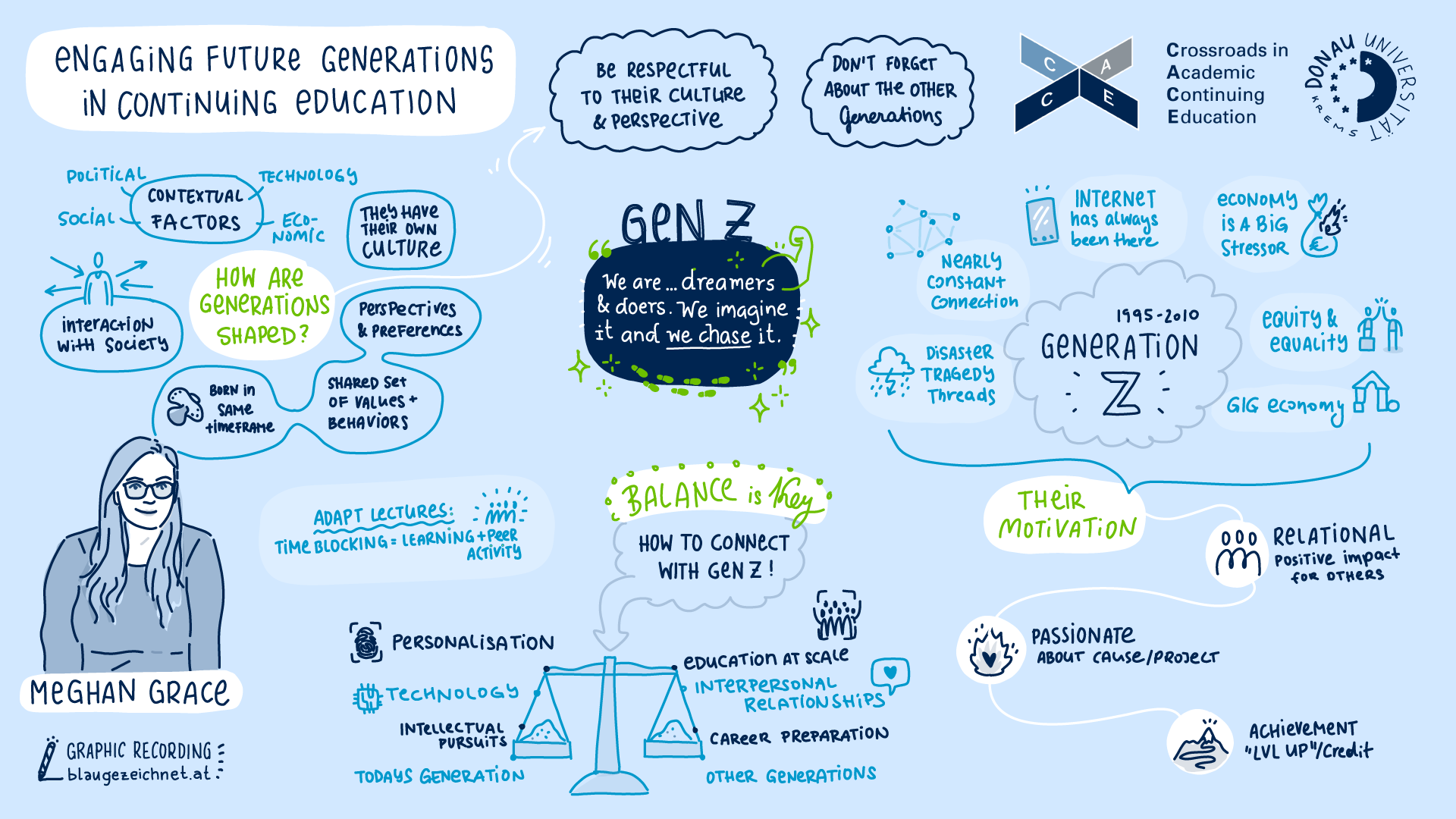
Generation Z is a thoroughly digital generation that has never known a world without the internet, explains Meghan Grace from the Institute of Generational Research and Education. How this generation thinks, feels and acts is the subject of her research and consultancy work. In her presentation at CACE, the US expert also addressed the question of how members of this generation can be inspired to pursue further education.
Grace begins with a definition: a generation is “a group of people born in a similar time frame who develop a similar set of values, behaviors, perspectives and preferences”. Technological, economic, social and political developments as they grow up shape a generation. Understanding these developments helps to understand a generation, says Grace.
She defines “Gen Z” as those born between 1995 and 2010. However, this demarcation is not set in stone. Someone born on December 31 of one year is probably not significantly different from someone born on January 1 of the next year, explains the expert.
Gen Z is characterized by the fact that it is a “digital generation”. They have grown up with constant internet availability and smartphones, which gives them access to a wealth of information that previous generations did not have. The ability to find out about global crises and disasters in real time has an impact on their personal sense of security. In addition, members of this generation have grown up with economic crises and financial cutbacks. They have a strong sense of equality, fairness and belonging. The job market has also changed noticeably for Generation Z. “The perfect job no longer exists,” explains Grace. Instead, young people have to create their dream job themselves and have an entrepreneurial spirit.
In her research, Meghan Grace examined the characteristic traits of Generation Z. The result: they are loyal, attentive, compassionate and responsible. They are also characterized by openness, determination and authenticity.
A central theme of the presentation is also the question of what motivates this generation - a crucial aspect, especially in the context of continuing education. Relationships are of great importance to Gen Z and they strive to stand up for others. At the same time, they are motivated to get passionately involved in projects they believe in. Striving to get ahead and reach the next “level” also plays a big role - a parallel to the fact that this generation grew up with video games.
In conclusion, Grace emphasizes: “Just because a new generation is coming doesn't mean that all previous approaches have to be thrown overboard.” That would be neither sensible nor realistic. “Further education institutions, at least in the USA, are not the fastest to change.” However, it is crucial to balance personalized learning with the scalability of modern education. Technology and personal learning experiences should be combined in a balanced way, as should intellectual employment and preparation for the labor market.
It is important to take the preferences of Generation Z into account when teaching, without neglecting the experience and knowledge of other generations. “Generation Z is not alone in the seminar room,” emphasizes Grace. She concludes by sharing a quote from a Gen Z student: “We are both dreamers and doers.” This generation wants to create a cleaner, more efficient world and places great value on connections - which is exactly what makes them so special.
About Meghan Grace

Dr. Meghan Grace is a leading generational expert whose research on Generation Z spans the last decade and has helped companies, universities, and associations understand generations to work better together.
Guided by multiple studies, Dr. Grace helps connect the dots between getting to know a generation and knowing what makes them tick. She is the host of the podcast, #GenZ and has co-authored three books on Generation Z with a new book on generations in the workplace coming later this year. When she isn’t researching, speaking, writing, or podcasting about generations, she co-leads the Institute for Generational Research and Education.